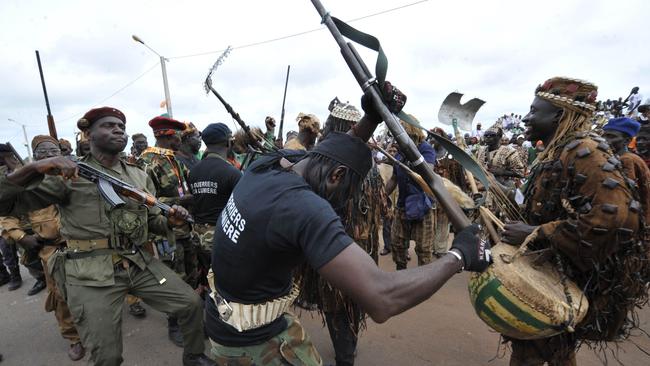Local heroes help save Australian miners’ lives in African war on terror

More than 200 Australian resource companies operate in Africa, many in West Africa. This represents a risk to our foreign and domestic interests because more than ever we need Australian companies rebuilding their balance sheets through offshore investment. Africa is a great place to do it, but we need to adopt unconventional risk strategies to protect Australians in these far-off places.
The Islamic State-affiliated group Islamic State in the Greater Sahara, and the al-Qa’ida-affiliated Jama’at Nasr al-Islam wal Muslimin are expanding in size, geographical coverage and sophistication. Last year, jihadists killed 4000 people in West Africa, but these murders are hardly reported. The most recent attack occurred last week. Ten soldiers were killed at an Ivory Coast-Burkina Faso border post. Ivory Coast is a key staging ground in the fight against Islamic State, and France uses it as an anti-insurgent logistics base.
Up to 20 Australian mining companies operate in Burkina Faso. Last November, jihadists ambushed five buses transporting workers on their way to the Canadian-owned Boungou mine, killing 37 civilians — the third attack in just 15 months. About 100 Australians work in Burkina Faso and Ivory Coast. Even when mining companies are not Australian-owned, Australians often work in these locations as engineers, geologists, site managers or service providers.
In 2015 and 2016, I went to the border of Ivory Coast and Mali with the purpose of disrupting and denying those affiliated to the group al-Qa’ida in the Islamic Maghreb. This followed attacks by Ansar al-Dine, an AQIM cousin. In June 2015, the group launched two attacks in southern Mali, close to the border with Ivory Coast. Following the attacks, AAD preacher Ismail Khalil warned it planned to “multiply the attacks in Ivory Coast” as well as other countries that “work with the enemies of Islam”. At the time, Australian mining company Perseus was building the Sissingue goldmine 2km from the Mali border. The plan was to deal with these terrorists from the beginning. (Epidemiologists will tell you it is better to deal with a pest at its origin stage.) This required applying an unconventional, adaptable, almost a non-military version of counterinsurgency. The 2013 attack on the BP and Statoil-owned In Amenas gas plant in Algeria, in which 39 foreigners were killed, had shown that you can have all the physical security you like — but without deep reciprocal relationships within the population, guns, armoured vehicles and barbed-wire fences can protect you only so far.
Neutralising AQIM jihadists in northern Ivory Coast involved weaving together a cross-border community web of protection. This involved working with, and through, a group of men appointed by the village called Dozos, as well as other key nodes of community leadership. The Dozo are fiercely proud, protective and loyal. We trusted each other with our lives. Despite being unable to speak their local dialect, using a stick in the dirt, after making them coffee and handing out lollipops, I drew a spider web connecting all the villages within a 50km radius. Through an interpreter I asked who wanted to be a spider to catch bugs trying to enter our web; they all put up both hands. We were in it together.
To take a village, insurgents or terrorists apply a simple framework. By co-opting or killing the three nodes of leadership in a village (security, political and religious), they begin to control increasingly larger areas of the human terrain. Maintaining community stability involves flipping that on its head — that is, protecting and supporting those nodes of leadership so they are recognised as strong, legitimate leaders in the community. With all layers working together, they act as a human early warning mechanism detecting even weak signals. Attacks are never spontaneous; a web sends signals to the spider whenever a bug enters it. In the end, through the Dozos, we built a decentralised, interwoven series of spider webs. This made it highly uncertain for the terrorists and more certain for the locals. The people need to know you are in it with them, not just the people in the tinted-windowed Land Rovers leaving the village covered in dust.
With all the technology in the world, the best way to detect, disrupt and deny space for these Islamist barbarians is to work with the population. Throwing money at the problem through ticking UN extractive industry guideline boxes will not save you, or your investment. The promise of millions in taxes and royalties means nothing to locals. Plenty of them will take your money and still not tell you when you are about to be attacked.
These are complex places. And just because these investments are also in locations most of us will never visit does not mean they’re less important.
We need to be build stronger webs of protection with our African partners because jihadists should not be allowed to put Australians at risk.
Anywhere.
Jason Thomas teaches risk management at Swinburne University of Technology and is director of Frontier Assessments.



The march of the Islamist beheaders has not stopped with the demise of Islamic State in Syria. Islamist extremists continue to infect our global system, increasing their attacks across West Africa. Islamic State and al-Qa’ida-aligned jihadists are trying to gain ground while the world is distracted by the COVID-19 pandemic. Much like a virus, terrorists look to exploit weaknesses within an immunity grey zone.